浙江省杭州市中考英语复习九年级课本之Unit 3-4复习学案(含答案)
文档属性
| 名称 | 浙江省杭州市中考英语复习九年级课本之Unit 3-4复习学案(含答案) | 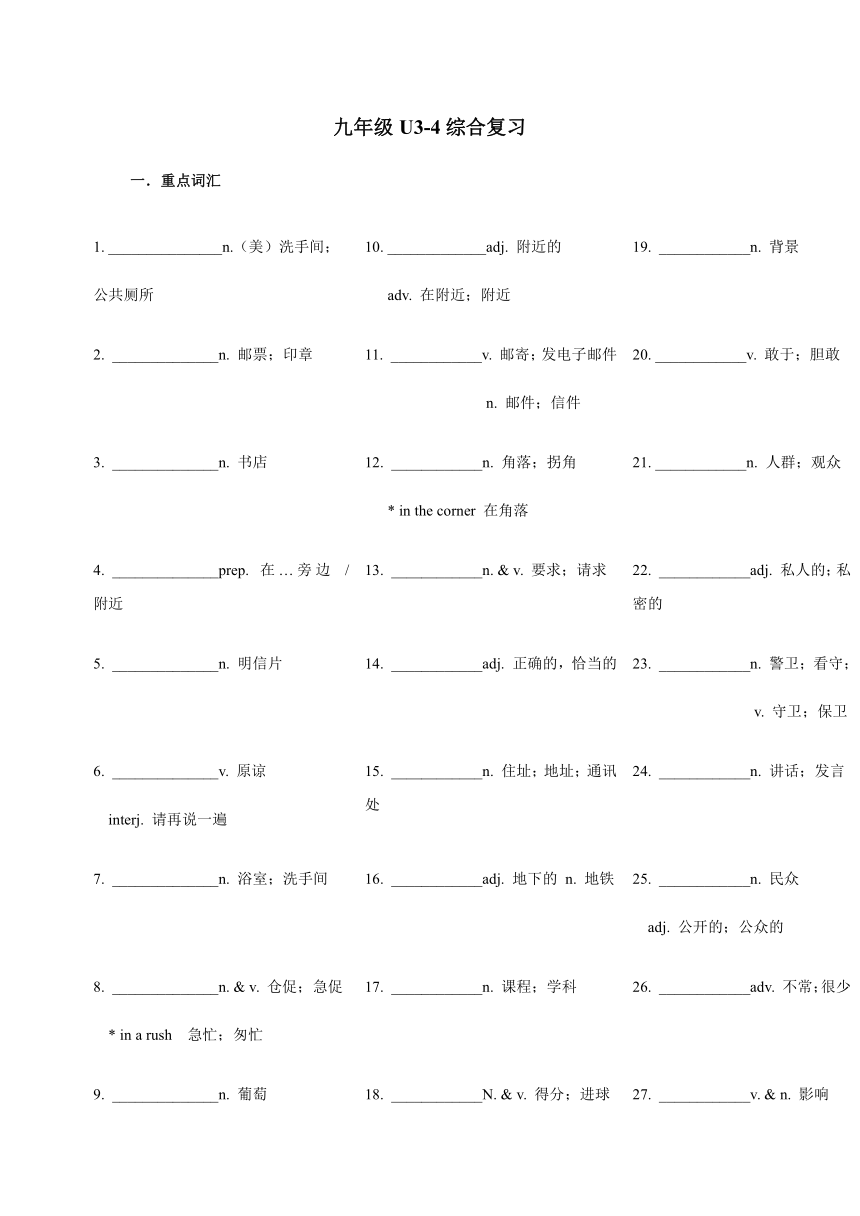 | |
| 格式 | zip | ||
| 文件大小 | 107.0KB | ||
| 资源类型 | 教案 | ||
| 版本资源 | 人教新目标(Go for it)版 | ||
| 科目 | 英语 | ||
| 更新时间 | 2020-04-13 10:32:36 | ||
图片预览

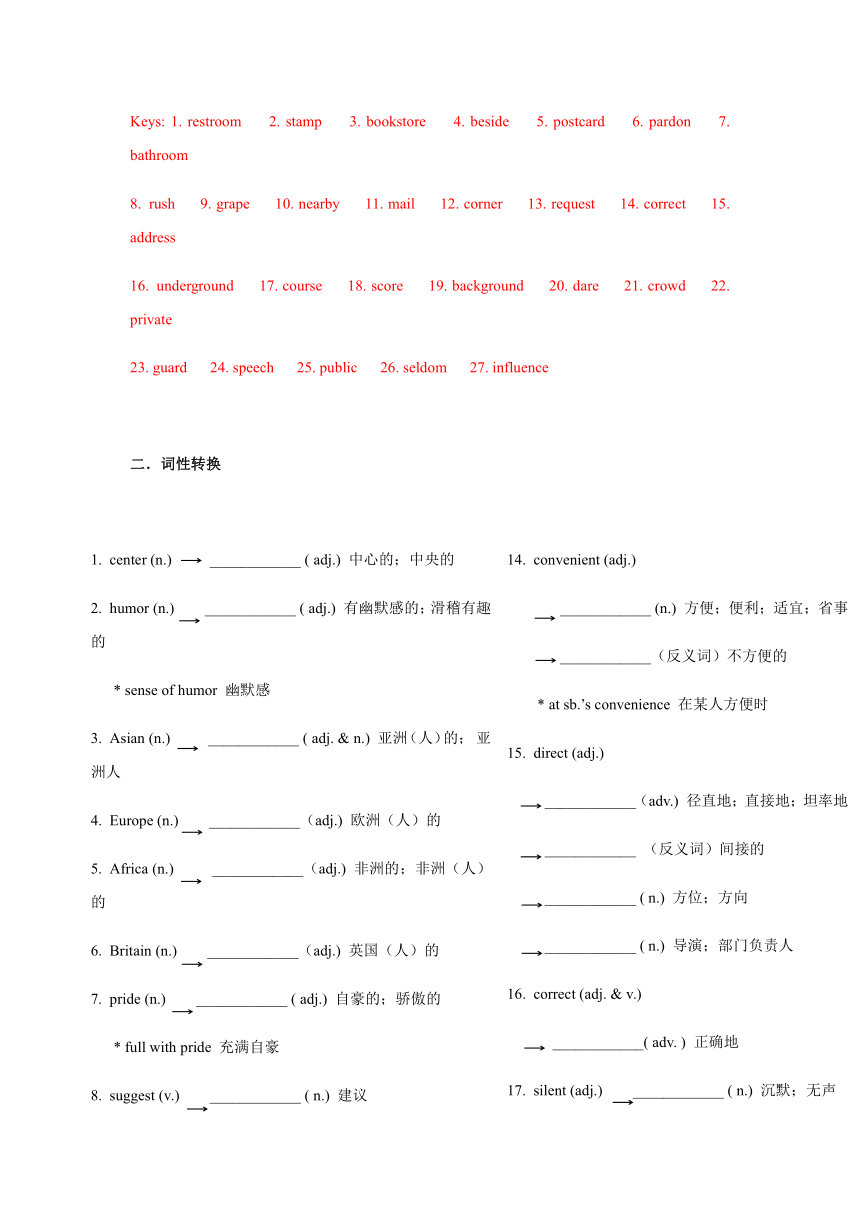
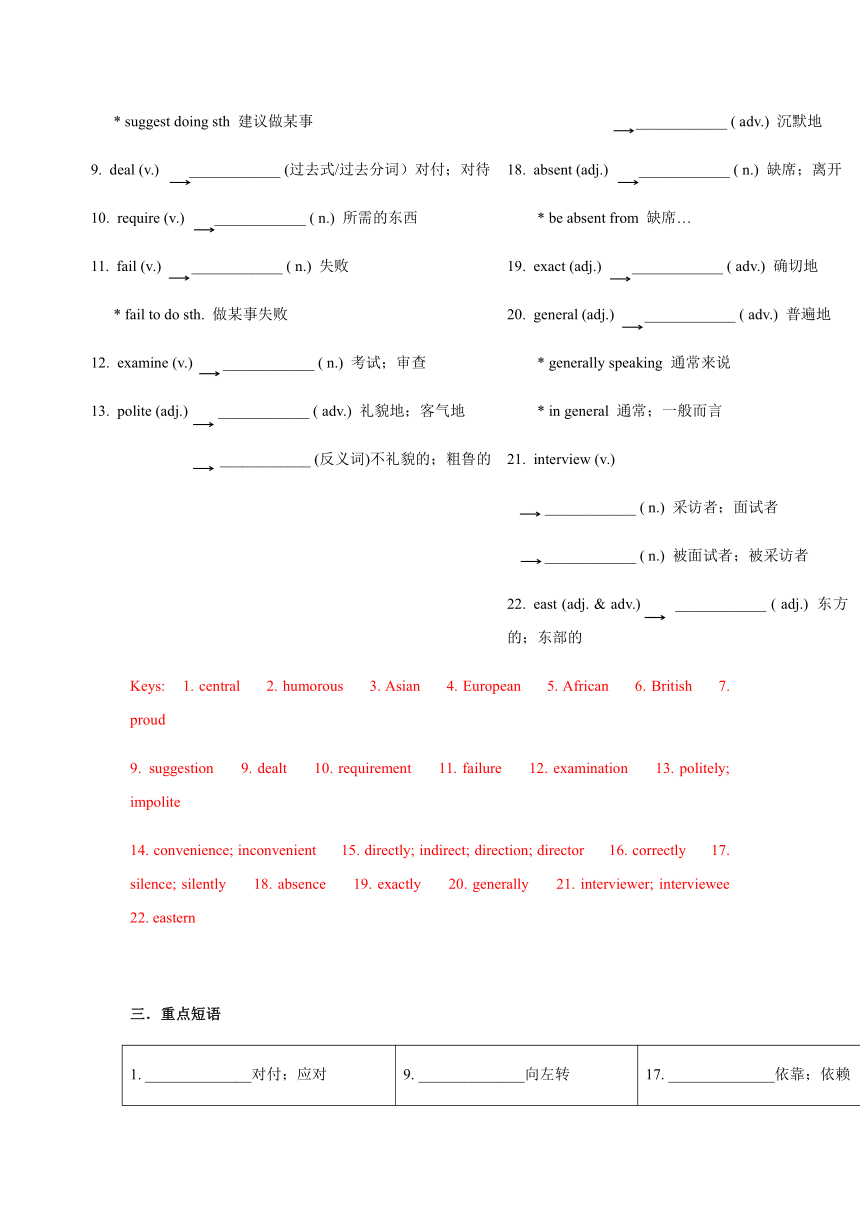
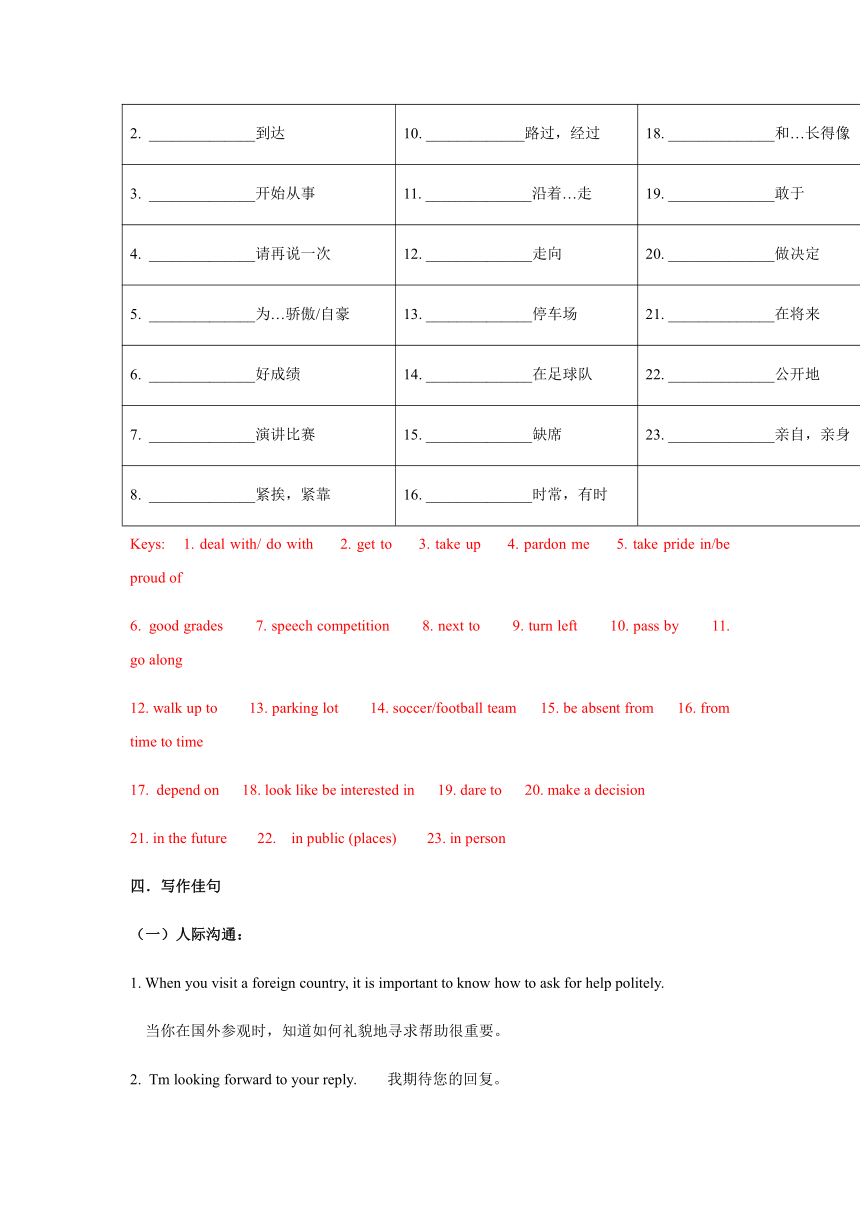
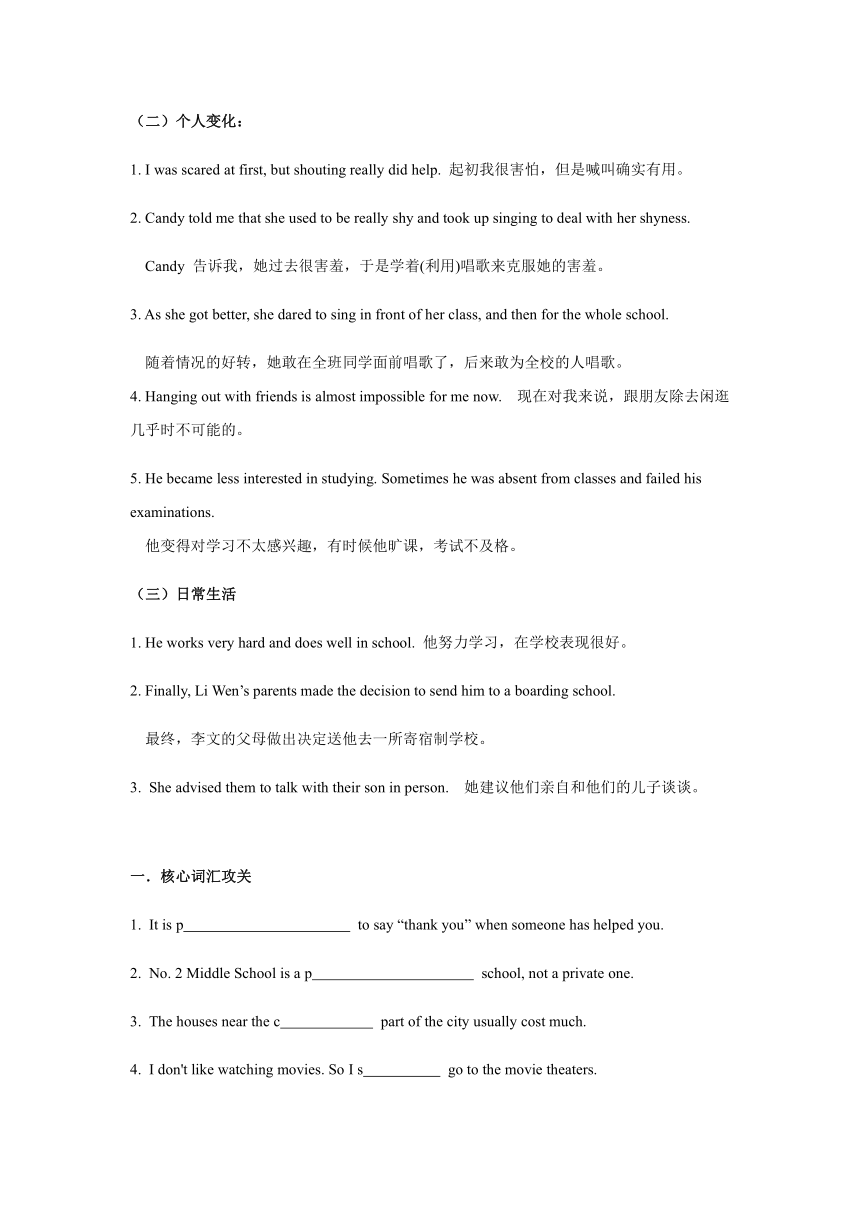
文档简介
九年级U3-4综合复习
一.重点词汇
1. _______________n.(美)洗手间;公共厕所 10. _____________adj. 附近的 adv. 在附近;附近 ____________n. 背景
______________n. 邮票;印章 ____________v. 邮寄;发电子邮件n. 邮件;信件 20. ____________v. 敢于;胆敢
______________n. 书店 ____________n. 角落;拐角 * in the corner 在角落 21. ____________n. 人群;观众
______________prep. 在…旁边 / 附近 ____________n. & v. 要求;请求 ____________adj. 私人的;私密的
______________n. 明信片 ____________adj. 正确的,恰当的 ____________n. 警卫;看守; v. 守卫;保卫
______________v. 原谅interj. 请再说一遍 ____________n. 住址;地址;通讯处 ____________n. 讲话;发言
______________n. 浴室;洗手间 ____________adj. 地下的 n. 地铁 ____________n. 民众 adj. 公开的;公众的
______________n. & v. 仓促;急促 * in a rush 急忙;匆忙 ____________n. 课程;学科 ____________adv. 不常;很少
______________n. 葡萄 ____________N. & v. 得分;进球 ____________v. & n. 影响
Keys: 1. restroom 2. stamp 3. bookstore 4. beside 5. postcard 6. pardon 7. bathroom
8. rush 9. grape 10. nearby 11. mail 12. corner 13. request 14. correct 15. address
16. underground 17. course 18. score 19. background 20. dare 21. crowd 22. private
23. guard 24. speech 25. public 26. seldom 27. influence
二.词性转换
center (n.) ____________ ( adj.) 中心的;中央的humor (n.) ____________ ( adj.) 有幽默感的;滑稽有趣的 * sense of humor 幽默感Asian (n.) ____________ ( adj. & n.) 亚洲(人)的; 亚洲人Europe (n.) ____________(adj.) 欧洲(人)的Africa (n.) ____________(adj.) 非洲的;非洲(人)的Britain (n.) ____________(adj.) 英国(人)的pride (n.) ____________ ( adj.) 自豪的;骄傲的 * full with pride 充满自豪suggest (v.) ____________ ( n.) 建议 * suggest doing sth 建议做某事deal (v.) ____________ (过去式/过去分词)对付;对待require (v.) ____________ ( n.) 所需的东西fail (v.) ____________ ( n.) 失败 * fail to do sth. 做某事失败examine (v.) ____________ ( n.) 考试;审查polite (adj.) ____________ ( adv.) 礼貌地;客气地 ____________ (反义词)不礼貌的;粗鲁的 convenient (adj.) ____________ (n.) 方便;便利;适宜;省事 ____________(反义词)不方便的 * at sb.’s convenience 在某人方便时 direct (adj.) ____________(adv.) 径直地;直接地;坦率地 ____________ (反义词)间接的____________ ( n.) 方位;方向____________ ( n.) 导演;部门负责人correct (adj. & v.) ____________( adv. ) 正确地silent (adj.) ____________ ( n.) 沉默;无声 ____________ ( adv.) 沉默地absent (adj.) ____________ ( n.) 缺席;离开 * be absent from 缺席…exact (adj.) ____________ ( adv.) 确切地general (adj.) ____________ ( adv.) 普遍地* generally speaking 通常来说* in general 通常;一般而言interview (v.) ____________ ( n.) 采访者;面试者 ____________ ( n.) 被面试者;被采访者east (adj. & adv.) ____________ ( adj.) 东方的;东部的
Keys: 1. central 2. humorous 3. Asian 4. European 5. African 6. British 7. proud
9. suggestion 9. dealt 10. requirement 11. failure 12. examination 13. politely; impolite
14. convenience; inconvenient 15. directly; indirect; direction; director 16. correctly 17. silence; silently 18. absence 19. exactly 20. generally 21. interviewer; interviewee 22. eastern
三.重点短语
1. ______________对付;应对 9. ______________向左转 17. ______________依靠;依赖
______________到达 10. _____________路过,经过 18. ______________和…长得像
______________开始从事 11. ______________沿着…走 19. ______________敢于
______________请再说一次 12. ______________走向 20. ______________做决定
______________为…骄傲/自豪 13. ______________停车场 21. ______________在将来
______________好成绩 14. ______________在足球队 22. ______________公开地
______________演讲比赛 15. ______________缺席 23. ______________亲自,亲身
______________紧挨,紧靠 16. ______________时常,有时
Keys: 1. deal with/ do with 2. get to 3. take up 4. pardon me 5. take pride in/be proud of
6. good grades 7. speech competition 8. next to 9. turn left 10. pass by 11. go along
12. walk up to 13. parking lot 14. soccer/football team 15. be absent from 16. from time to time
17. depend on 18. look like be interested in 19. dare to 20. make a decision
21. in the future 22. in public (places) 23. in person
四.写作佳句
(一)人际沟通:
1. When you visit a foreign country, it is important to know how to ask for help politely.
当你在国外参观时,知道如何礼貌地寻求帮助很重要。
2. Tm looking forward to your reply. 我期待您的回复。
(二)个人变化:
1. I was scared at first, but shouting really did help. 起初我很害怕,但是喊叫确实有用。
2. Candy told me that she used to be really shy and took up singing to deal with her shyness.
Candy 告诉我,她过去很害羞,于是学着(利用)唱歌来克服她的害羞。
3. As she got better, she dared to sing in front of her class, and then for the whole school.
随着情况的好转,她敢在全班同学面前唱歌了,后来敢为全校的人唱歌。
4. Hanging out with friends is almost impossible for me now. 现在对我来说,跟朋友除去闲逛几乎时不可能的。
5. He became less interested in studying. Sometimes he was absent from classes and failed his examinations.
他变得对学习不太感兴趣,有时候他旷课,考试不及格。
(三)日常生活
1. He works very hard and does well in school. 他努力学习,在学校表现很好。
2. Finally, Li Wen’s parents made the decision to send him to a boarding school.
最终,李文的父母做出决定送他去一所寄宿制学校。
3. She advised them to talk with their son in person. 她建议他们亲自和他们的儿子谈谈。
1.核心词汇攻关
1. It is p to say “thank you” when someone has helped you.
2. No. 2 Middle School is a p school, not a private one.
3. The houses near the c part of the city usually cost much.
4. I don't like watching movies. So I s go to the movie theaters.
5. A dictionary is a very h tool for you when you learn language.
6. Harry was so s at the meeting that he even didn't say one word.
7. I live near a subway station. It's really c to get to any part of the city.
8. When I f my exams, my parents usually en?courage me instead of punishing me.
9. As the famous saying goes, e or west, home is best.
10. Complete the sentences with the c forms of the verbs in the box.
11. G speaking, nearly all teachers like students who study hard in their subjects.
12. He is very h . He can tell funny stories to make people laugh.
13. I sat b the window of the train, watching the trees past the window.
14. He was the p of the village after winning the championship of the singing competition.
15. The president is going to give a s in public to?morrow morning. This piece of news leads to a heated
discussion among people.
16. It’s (polite) to break in when someone is talking.
17. You will never reach your destination if you go in the opposite ( direct).
18. No one knows the time ( exact) when the building of the Great Wall was started.
19. Tom (rush) out of the classroom just now. He must have something important.
20. Before entering a house in some ( Asia) countries, it is a good manner to take off your shoes.
21. On Teachers’ Day, all the teachers were very happy be?cause they received many beautiful (postcard)
and flowers.
22. What good news! Our school has announced that we can choose three ( course) according to our
interests in each term.
23. Finally the girl overcame her ( shy) , and made a wonderful speech in front of the whole class.
24. I plan to travel to several (Europe) countries during this summer vacation.
25. When I ( pass) by the window, I saw two men sitting on a sofa and talking.
26. John practices (speak) English every day because he thinks practice makes perfect.
27. A reporter is (interview) Mr. President, and they're talking about the education problems.
28. Although everyone wants to succeed in what he or she tries to do, sometimes (fail) can't be avoided.
29. I don't know how to get ready for the coming examination. Could you please give me some (suggestion)?
30. The actions and words of celebrities(名人)can have a great (influence) because many people may
follow them. So they should pay more attention to their behaviors and speeches.
Keys:
1.polite 2.public 3.central 4.seldom 5.helpful 6.silent 7.convenient 8.fail 9.east 10.correct
11.Generally 12.humorous 13.beside 14.pride 15.speech 16.impolite 17.direction 18.exactly
19.rushed 20.Asian 21.postcards 22.courses 23.shyness 24.European 25.passed
26.speaking 27.interviewing 28. failure 29.suggestions 30.influence
2.综合训练
A
Although people everywhere seem to enjoy drinking coffee, they don’t all have the same coffee culture. In Europe for example, coffee shops are common places for people to meet friends and to talk while they drink coffee. On the other hand, places like this were not as common in North America in the past. Instead, people in North America liked to drink coffee in their homes with friends. The coffee culture in the USA changed when Starbucks(星巴克) coffee shops spread across the country.
The first Starbucks coffee shop opened in 1971 in downtown Seattle, Washington, in the USA. It was a small coffee shop that cooked its own coffee beans. The coffee shop’s business did well, and by 1981 there were three Starbucks stores in Seattle.
Things really began to change for the company in 1981.That year, Howard Schultz met the three men who ran Starbucks. Schultz worked in New York for a company that made kitchen equipment. He noticed that Starbucks ordered a large number of special coffee makers, which caused his great interest. Schultz went to Seattle to see what Starbucks did. In 1982, the original Starbucks owners hired Schultz as the company’s head of marketing(市场营销).
In 1983, Schultz traveled to Italy. The special environment of the espresso (浓咖啡) bars there caught his eyes. Back in the USA, Schultz created an environment for Starbucks coffee shops that was comfortable and casual, and customers everywhere seemed to like it. Starbucks began opening more stores across the USA. Then the company opened coffee shops in other countries as well. Today, there are more than 16,000 Starbucks coffee shops all over the world.
However, that does not mean Starbucks has not had problems. In fact, many Starbucks stores have closed over the past few years. On the one hand, this is because there were too many coffee shops competing for business in one small area. On the other hand, stores in some countries closed because the coffee culture there did not match with the “feel the same everywhere” environment offered by Starbucks.
26. The underlined word “ran” in Paragraph 3 probably means “?????? ”.
A.closed" W5 f* b2 K. D2 V B.managed$ I2 D* S/ F Z0 W3 ]9 P
C.left) [5 W i" g$ G& D( _! V D.sold# e6 f3 X" S. L4 F: U: F( A0 T
27. According to the passage, which is the right order for the following sentences?
a. This man helped to make Starbucks a huge coffee company.
b. Starbucks began as a small coffee company in Seattle in the USA.
c. He went to Seattle to learn about the company and later worked for it.
b. Howard Schultz noticed Starbucks ordered lots of special coffee makers.
A. a-b-d-c??????????? B. c-a-b-d????????????
C. b-d- c-a??????????? D. d-c-a-b
28.Why did so many Starbucks close in small areas?
A. Because the coffee in these places was too expensive: g! V0 h8 E) W) S
B.Because the style of the coffee stores seems the same. 9 B- b6 P2 V; e( J1 ]
C. Because people like to drink coffee at home with friends.. E5 J2 U2 J$ G$ R. A& ?. F# O
D. Because there were too many coffee shops in one place.4 P: O# L# `" j
29. Which of the following shows the right structure of the passage? (P=paragraph)
A. B. C. D.
26-30 BCDCA
任务型阅读(共5小题,每小题2分,满分10分)
请仔细阅读第31-35题中的内容,然后从A到F的六个选项中,选出最佳标题选项,其中一项为多余选项。
A. Never be afraid to give
B.Plan ahead as much as possible
C. Work out your priorities(优先考虑的事)
D.Be disciplined(有纪律的) at all times
E. Make sure everything has its place
F. Stick to a schedule
Being Well-Organized And Getting Things Done
Being well-organized and getting things done and what we have done is tried to make them as easy to follow as possible to allow you to implement(实施) them immediately. There is no doubt that being organized does make a difference .
31. ________________________
It is something that you should do every single day and the best way to approach this is to place things in order of importance. Watching that movie may sound like a good idea, but put that at the bottom of the list and focus on things that influence your work, health, or anything else that is key to your survival(生存).
32. ________________________
Next, you should consider trying to plan ahead, so if you know that there is an appointment at a certain location for a certain time, then plan your day around that appointment.
33. ________________________
Knowing where everything is really will allow you to get more things done as you will waste less time hunting for that object that you require to complete your task. Too much time is wasted hunting for keys or that piece of paper and it also just stresses you out and can upset your pace.
34. ________________________
Giving tasks to others will always lead to you getting more done, but it is not just a case of picking anybody to do a task. Instead, you need to make sure that they are capable of doing it without running into any problems and that they do have the correct tools to complete the job.
35. ________________________
Having a schedule will help to force you into completing tasks on time and actually getting more done in the process. The only problem here is that you need to be sensible when working out how long something takes or you will put undue pressure on yourself and this is where mistakes can occur and you will actually then start to get less done.
31-35 CBEAF
